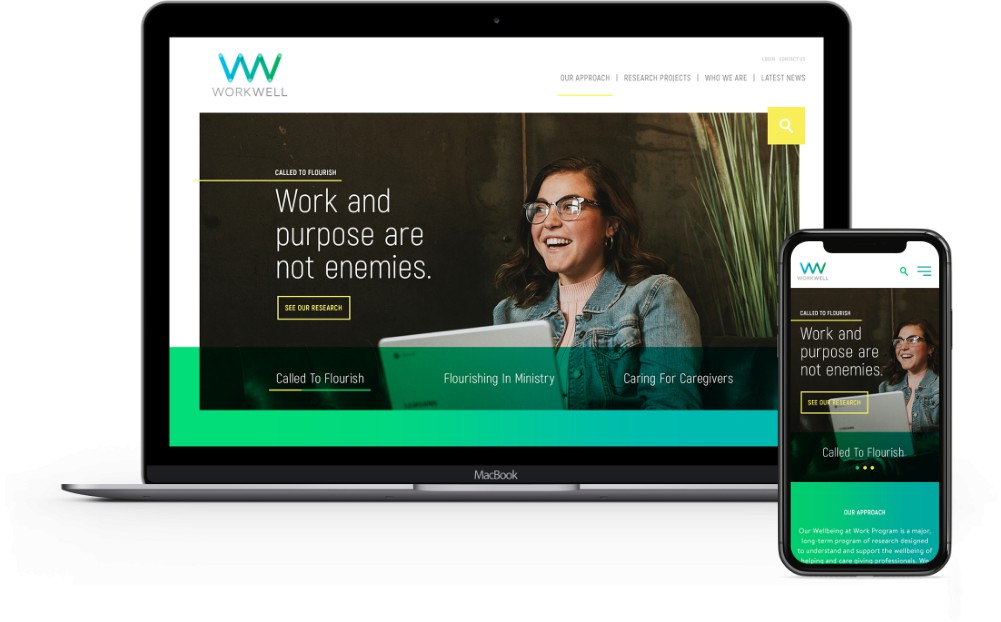What if religions could bridge the gap between work and purpose? What if religions were a path to work/life balance?
Dr. Matt Bloom, associate professor at the University of Notre Dame, is seeking to understand if and how religion might positively effect the work environment. This project gives special attention to the healthcare and technology industries – both notorious for burnout. Dr. Bloom and his team are studying data collected via mobile app that monitors workplace wellbeing and provides faith practices to encourage flourishing at work.
Healthcare and technology are two industries that are increasingly demanding. Bloom says, “With healthcare, the main concern in the decrease in work-life balance in this sector is that healthcare professionals burnout so badly that they will need to leave their profession. Not only is that bad for them, it is detrimental to us as a society.”
He goes on to explain, “Technology, on the other hand, is a hungry beast. As soon you feed it with one innovation, it is hungry for another.”
“More than two-thirds of Americans find work as the single most stressful thing in their lives,” says Bloom. “In some industries, specifically healthcare and technology, research shows that burnout, depression, divorce, and suicide rates are trending up. At Notre Dame we are asking ourselves, ‘What if faith was a path to work-life balance?’” This project builds on previous research by Bloom and his team that focused on the wellbeing of clergy and their families.

We live in the most connected society in history. But are we flourishing? What if we could help each other take small steps to turn those trends around?
Despite its central role in our lives, for many, work is simply a job, a source of financial income to support themselves and the ones they love. Others conceive of their work as a career. For those who embrace this vision, obtaining financial success and achieving upward progression are central goals. Differently from them, some individuals would rather consider their work as a craft: pursuing mastery and excellence are central to their way of understanding this dimension of their life. Finally, when asked to define their relationship to their work, some people would define it as a calling.
Facts
40% of U.S. adults report feeling lonely
62% of U.S. college students report “overwhelming anxiety”
88% of U.S. employees report they lack passion for their work
According to Gallup’s World Poll, 63% of the global workforce is “checked out” and “sleepwalking through their workday.” The Wall Street Journal notes that more than half of American workers are less content with their jobs than they were thirty years ago in nearly every individual measure—from wages and retirement plans to vacation policies and commutes.
There is a large discrepancy between what we want from work and our actual work experience—this disconnect creates unhappy workers. And not surprisingly, unhappy workers act out their unhappiness at work. Our research will enable us to understand what factors drive this unhappiness, as well as which factors contribute to wellbeing and flourishing in the workplace.
As adults, most of our life is spent at work. The time we spend working far exceeds what we dedicate to any other activity: family, eating, or simply relaxing. However the impact of work on our lives goes far beyond time – for better or for worse, much of what we are shaped by is our professional environment and relationships.
The majority of people work for 40 years or more. Yet, little is known about how our work lives evolve over time. The science of wellbeing has only been around for about three decades – only a short time in science-years. But the goal of this research is profound: to understand the best, most positive dimension of life. Dr. Bloom’s research surfaces from a multidimensional understanding of the conditions that foster, or impede, positive work experiences, and the ability to be content, and flourish, in the short term, and over our lifetimes. Dr. Bloom and his team have identified four dimensions of wellbeing for working adults as a way to measure happiness, as mentioned in the “Wellbeing Model” below.
Resilience
Our capacity to adapt, change, and respond to life’s challenges. Resilience enables us to recover from setbacks, to grow, and to develop new capabilities.
Thriving
The meaning and significance we experience in our lives; our values, core beliefs, and sense of life purpose; and our experience of deep social connections.
Authenticity
Our sense of identity, which includes the beliefs we hold about who we are as human beings, our self-image and self-worth, and our sense of respect and dignity.
Happiness
The emotional dynamics and the subjective quality of our daily lives. Happiness is linked to enhanced health, creativity, decision-making, and adversity response.
“Called to Flourish” is a three-year study designed to understand and support the wellbeing of helping and care giving professionals. During this on-going research, Dr. Bloom and his team are surveying thousands of individuals and also conducting life narrative interviews with several hundred humanitarian workers in the field in order to learn more about how work life unfolds day-by-day.

